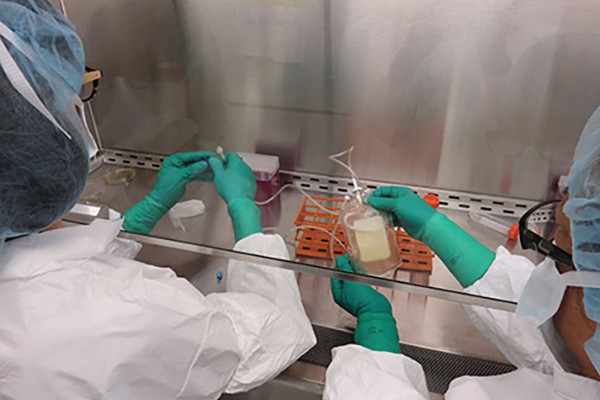School of Medicine faculty educate, entertain on ‘Science Friday’
Beatriz Carreno, PhD, was featured Friday, April 3, on the syndicated radio show “Science Friday,” where she talked about School of Medicine research involving personalized melanoma vaccines. Carreno is the fourth faculty member in recent months to appear on the show.
Personalized melanoma vaccines marshal powerful immune response
Personalized melanoma vaccines can be used to marshal a powerful immune response against unique mutations in patients’ tumors, according to early data in a first-in-people clinical trial at Washington University School of Medicine in St. Louis. The research is a boost to cancer immunotherapy, a treatment strategy that unleashes the immune system to seek out and destroy cancer.
Fish prone to melanoma get DNA decoded
Scientists have decoded the genome of the platyfish, a cousin of the guppy and a popular choice for home aquariums. Scientists are interested in the fish because they tend to develop melanomas along the tail and fin.
Rising melanoma rates among adolescents, children are subject of new study
With springtime temperatures and warm weather approaching, the inclination to spend time outdoors is a strong one – especially for children who have been cooped up all winter. But parents should be vigilant about sunscreen. And teenage girls might want to rethink springtime tanning and tanning beds. A new study out of the Brown School, led by senior author Kimberly J. Johnson, looks at the increase of melanoma in children and adolescents and what those trends might be telling us.
Majority of Missouri tan salons allow preteens
A survey of tanning salon operators in Missouri shows that 65 percent would allow children as young as 10 to 12 years old to use tanning beds. That’s despite evidence that any tanning bed use increases the risk of all skin cancers, including melanoma, the deadliest form of skin cancer, later in life.
Gene in eye melanomas linked to good prognosis
Melanomas that develop in the eye often are fatal. Now, scientists at Washington University School of Medicine in St. Louis report they have identified a mutated gene in melanoma tumors of the eye that appears to predict a good outcome.
Cornelius named Showman Professor
Lynn A. Cornelius, chief of the Division of Dermatology at Washington University School of Medicine, has been named the Winfred A. and Emma R. Showman Professor in Dermatology. Cornelius specializes in the treatment and research of melanoma, a deadly skin cancer.
WUSTL licenses gene linked to cancer spread
Washington University in St. Louis has licensed to Castle Biosciences Inc. the exclusive use of a gene to detect the spread of cancer in melanoma patients. A link between the BAP1 gene and cancer metastasis was discovered by Washington University scientists J. William Harbour, MD, an ophthalmologic oncologist, and Anne Bowcock, PhD, a geneticist.
Seeing melanoma
Two scientists at Washington University in St. Louis are able to image subcutaneous melanoma tumors with startling clarity. Their imaging technique relies on sound rather than light because sound is less strongly scattered by tissues. In addition, the tumors are preloaded with a nanoparticle contrast agent that latches onto proteins that stud the surface of the cancerous cells.
Proper UV protection for your eyes is important for summer
Photo courtesy of WUSTLIt’s very important to get sunglasses with UV protection and to wear them at an early age.We all know the importance of using sunscreen to protect our skin from the sun’s harmful rays, but what about protection for our eyes? July is UV Safety Month and prolonged exposure to the sun’s ultraviolet rays without protection may cause eye conditions that can lead to vision loss, such as cataracts and age-related macular degeneration. Sunglasses and wide-brimmed hats are your best protection against UV-related vision problems, but be careful when you’re shopping for sunglasses — the wrong kind of lenses might do more harm than good.
View More Stories


